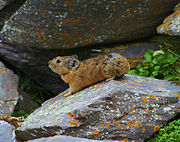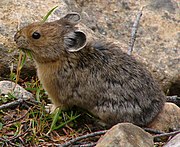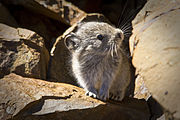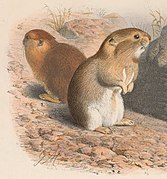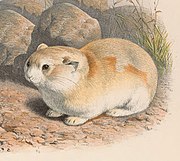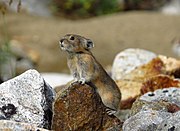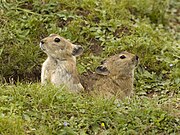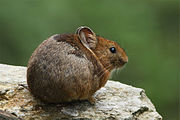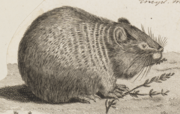List of ochotonids

Ochotonidae is a family of small mammals in the order Lagomorpha. A member of this family is called an ochotonid or, colloquially, a pika. They are widespread throughout Asia and western North America, and are generally found in grassland, shrubland, and rocky biomes. Pikas are all roughly the same shape and size, with no tails, ranging from the 11 cm (4 in) long Gansu pika to the 29 cm (11 in) long northern pika. No species have population estimates and many have not yet had their conservation status evaluated, though the Helan Shan pika, Hoffmann's pika, Ili pika, and Koslov's pika are considered endangered.
The 29 extant species of Ochotonidae are contained within a single genus, Ochotona, though that genus is sometimes split into four subgenera: Alienauroa, Conothoa (mountain pikas), Ochotona (shrub-steppe pikas), and Pika (northern pikas). Many extinct Ochotonidae species have been discovered, though due to ongoing research and discoveries the exact number and categorization is not fixed.[1]
Conventions
| Conservation status | |
|---|---|
| EX | Extinct (0 species) |
| EW | Extinct in the wild (0 species) |
| CR | Critically Endangered (0 species) |
| EN | Endangered (4 species) |
| VU | Vulnerable (0 species) |
| NT | Near threatened (0 species) |
| LC | Least concern (24 species) |
| Other categories | |
| DD | Data deficient (1 species) |
| NE | Not evaluated (0 species) |
Conservation status codes listed follow the International Union for Conservation of Nature (IUCN) Red List of Threatened Species. Range maps are provided wherever possible; if a range map is not available, a description of the ochotonid's range is provided. Ranges are based on the IUCN Red List for that species unless otherwise noted. All extinct species or subspecies listed alongside extant species went extinct after 1500 CE, and are indicated by a dagger symbol "†".
Classification
The family Ochotonidae consists of twenty-nine extant species in one genus which are divided into dozens of extant subspecies. This does not include hybrid species or extinct prehistoric species.
Ochotonids
The following classification is based on the taxonomy described by Mammal Species of the World (2005), with augmentation by generally accepted proposals made since using molecular phylogenetic analysis, as supported by both the IUCN and the American Society of Mammalogists.[2]
| Common name | Scientific name and subspecies | Range | Size and ecology | IUCN status and estimated population |
|---|---|---|---|---|
| Afghan pika | O. rufescens (Gray, 1842) Three subspecies
|
Central Asia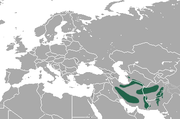
|
Size: 15–24 cm (6–9 in) long[3] Habitat: Forest, shrubland, and desert[4] Diet: Herbs and shrubs[4] |
LC
|
| Alpine pika | O. alpina (Pallas, 1773) Four subspecies
|
Northeastern Asia
|
Size: 15–26 cm (6–10 in) long[5] Habitat: Rocky areas[6] Diet: Variety of plants[6] |
LC
|
| American pika | O. princeps (Richardson, 1828) Five subspecies
|
Western North America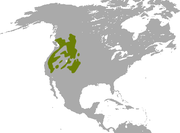
|
Size: 15–22 cm (6–9 in) long[7] Habitat: Rocky areas[8] Diet: Sedges, grass, forbs, and shrubs[7] |
LC
|
| Chinese red pika | O. erythrotis (Büchner, 1890) |
Central China
|
Size: 18–19 cm (7–7 in) long[9] Habitat: Rocky areas[10] Diet: Variety of plants[10] |
LC
|
| Collared pika | O. collaris (Nelson, 1893) |
Northwestern North America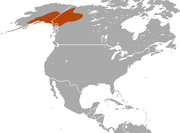
|
Size: 14–21 cm (6–8 in) long[11] Habitat: Rocky areas[12] Diet: Variety of plants, as well as bird brains[12] |
LC
|
| Daurian pika | O. dauurica (Pallas, 1776) Four subspecies
|
Northeastern Asia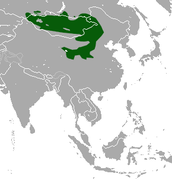
|
Size: 17–22 cm (7–9 in) long[13] Habitat: Grassland[14] Diet: Shrubs, grass, legumes, and flowers[13] |
LC
|
| Forrest's pika
|
O. forresti Thomas, 1923 |
Southeastern Asia
|
Size: 15–19 cm (6–7 in) long[15] Habitat: Forest and shrubland[16] Diet: Variety of plants[16] |
LC
|
| Gansu pika | O. cansus Lyon, 1907 Four subspecies
|
Central China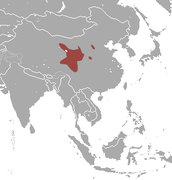
|
Size: 11–17 cm (4–7 in) long[17] Habitat: Shrubland and grassland[18] Diet: Shrubs and other plants[18] |
LC
|
| Glover's pika
|
O. gloveri Thomas, 1922 Three subspecies
|
Central China
|
Size: 16–25 cm (6–10 in) long[19] Habitat: Rocky areas[20] Diet: Forbs, sedge, and grass[19] |
LC
|
| Helan Shan pika
|
O. argentata Howell, 1928 |
Central China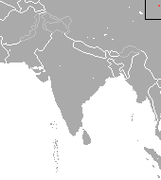
|
Size: 20–24 cm (8–9 in) long[21] Habitat: Rocky areas[22] Diet: Variety of plants[22] |
EN
|
| Hoffmann's pika
|
O. hoffmanni Formozov, Yakhontov, Dmitriev, 1996 |
Northern Mongolia
|
Size: 19–21 cm (7–8 in) long[23] Habitat: Rocky areas[24] Diet: Variety of plants[23] |
EN
|
| Ili pika
|
O. iliensis Li, Ma, 1986 |
Western China
|
Size: 20–21 cm (8–8 in) long[25] Habitat: Rocky areas[26] Diet: Herbs and shrubs[25] |
EN
|
| Kazakh pika
|
O. opaca Argiropulo, 1930 |
Central Asia | Size: 17–22 cm (7–9 in) long[27] Habitat: Grassland and rocky areas[28] Diet: Shrubs, herbs, and grass[27] |
LC
|
| Korean pika
|
O. coreana Allen, Andrews, 1913 |
North Korea and southeastern China | Size: 16–21 cm (6–8 in) long[29] Habitat: Rocky areas[30] Diet: Herbs, shrubs, forbs, fungi, berries, seeds, and lichen[30] |
DD
|
| Koslov's pika | O. koslowi (Büchner, 1894) |
Western China
|
Size: 22–24 cm (9–9 in) long[31] Habitat: Grassland[32] Diet: Sedges and other plants[31] |
EN
|
| Ladak pika | O. ladacensis (Günther, 1875) |
Western China and northern India and Pakistan
|
Size: 18–25 cm (7–10 in) long[33] Habitat: Grassland[34] Diet: Shrubs, flowers, and roots[33] |
LC
|
| Large-eared pika | O. macrotis (Günther, 1875) Five subspecies
|
Central Asia and central China
|
Size: 15–20 cm (6–8 in) long[35] Habitat: Rocky areas[36] Diet: Grass, legumes, sedges, herbs, berries, twigs, moss, and lichen[37] |
LC
|
| Manchurian pika
|
O. mantchurica Thomas, 1909 |
Northeastern China | Size: 13–22 cm (5–9 in) long[38] Habitat: Forest, shrubland, and rocky areas[39] Diet: Variety of plants[38] |
LC
|
| Moupin pika
|
O. thibetana (Milne-Edwards, 1871) Five subspecies
|
Central China
|
Size: 14–18 cm (6–7 in) long[40] Habitat: Forest and shrubland[41] Diet: Variety of plants[41] |
LC
|
| Northern pika | O. hyperborea (Pallas, 1811) Seven subspecies
|
Northeastern Asia
|
Size: 13–29 cm (5–11 in) long[42] Habitat: Forest, shrubland, and rocky areas[43] Diet: Herbs, shrubs, forbs, fungi, berries, seeds, and lichen[42] |
LC
|
| Nubra pika
|
O. nubrica Thomas, 1922 Two subspecies
|
South Asia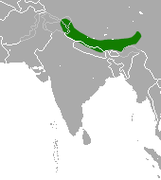
|
Size: 14–19 cm (6–7 in) long[44] Habitat: Shrubland and grassland[45] Diet: Variety of plants[44] |
LC
|
| Pallas's pika | O. pallasi (Gray, 1867) Four subspecies
|
Central and Eastern Asia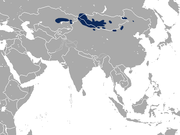
|
Size: 19–23 cm (7–9 in) long[46] Habitat: Grassland and rocky areas[47] Diet: Grass and herbs[48] |
LC
|
| Plateau pika | O. curzoniae (Hodgson, 1858) |
Western China and Northern India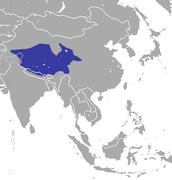
|
Size: 16–21 cm (6–8 in) long[29] Habitat: Grassland and desert[49] Diet: Variety of plants[49] |
LC
|
| Royle's pika | O. roylei (Ogilby, 1839) Two subspecies
|
Western China and Northern India | Size: 13–21 cm (5–8 in) long[50] Habitat: Rocky areas[51] Diet: Forbs, as well as other plants[50] |
LC
|
| Steppe pika | O. pusilla (Pallas, 1769) Two subspecies
|
Central Asia
|
Size: 15–21 cm (6–8 in) long[52] Habitat: Shrubland and grassland[53] Diet: Grass and above-ground vegetation[52] |
LC
|
| Thomas's pika
|
O. thomasi Argiropulo, 1948 |
Central China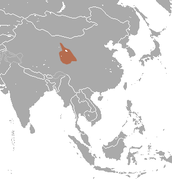
|
Size: 13–16 cm (5–6 in) long[54] Habitat: Shrubland and grassland[55] Diet: Variety of plants[55] |
LC
|
| Tsing-ling pika
|
O. syrinx Matschie, 1908 |
Central China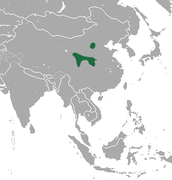
|
Size: 13–18 cm (5–7 in) long[56] Habitat: Forest and shrubland[57] Diet: Variety of plants[57] |
LC
|
| Turkestan red pika | O. rutila (Sévertsov, 1873) |
Central Asia
|
Size: 18–26 cm (7–10 in) long[58] Habitat: Rocky areas[59] Diet: Grass and other plants[59] |
LC
|
| Turuchan pika | O. turuchanensis Naumov, 1934 |
Central Russia
|
Size: 15–22 cm (6–9 in) long[60] Habitat: Rocky areas[61] Diet: Variety of plants[61] |
LC
|
References
- ^ "Fossilworks: Ochotonidae". Paleobiology Database. University of Wisconsin–Madison. Retrieved December 17, 2021.
- ^ Wilson, Reeder, pp. 185–192
- ^ Smith, Johnston, Alves, Hackländer, p. 77
- ^ a b c Smith, A. T.; Johnston, C. (2016). "Ochotona rufescens". IUCN Red List of Threatened Species. 2016: e.T41269A45184750. doi:10.2305/IUCN.UK.2016-3.RLTS.T41269A45184750.en.
- ^ Smith, Johnston, Alves, Hackländer, p. 31
- ^ a b c Smith, A. T.; Cook, J. (2016). "Ochotona alpina". IUCN Red List of Threatened Species. 2016: e.T41255A45182115. doi:10.2305/IUCN.UK.2016-3.RLTS.T41255A45182115.en.
- ^ a b Smith, Johnston, Alves, Hackländer, pp. 68–70
- ^ a b Smith, A. T. and Beever; E. (2016). "Ochotona princeps". IUCN Red List of Threatened Species. 2016: e.T41267A45184315. doi:10.2305/IUCN.UK.2016-3.RLTS.T41267A45184315.en.
- ^ Smith, Johnston, Alves, Hackländer, p. 46
- ^ a b c Smith, A. T.; Lissovsky, A. (2016). "Ochotona erythrotis". IUCN Red List of Threatened Species. 2016: e.T41260A45183115. doi:10.2305/IUCN.UK.2016-3.RLTS.T41260A45183115.en.
- ^ Smith, Johnston, Alves, Hackländer, p. 36
- ^ a b c Lanier, H. and Hik; D. (2016). "Ochotona collaris". IUCN Red List of Threatened Species. 2016: e.T41257A45182533. doi:10.2305/IUCN.UK.2016-3.RLTS.T41257A45182533.en.
- ^ a b Ciwko, Erin (2014). "Ochotona dauurica". Animal Diversity Web. University of Michigan. Retrieved October 17, 2021.
- ^ a b Smith, A. T.; Cook, J. (2016). "Ochotona dauurica". IUCN Red List of Threatened Species. 2016: e.T41259A45182905. doi:10.2305/IUCN.UK.2016-3.RLTS.T41259A45182905.en.
- ^ Smith, Johnston, Alves, Hackländer, p. 47
- ^ a b c Smith, A. T.; Liu, S. (2016). "Ochotona forresti". IUCN Red List of Threatened Species. 2016: e.T15048A45178927. doi:10.2305/IUCN.UK.2016-3.RLTS.T15048A45178927.en.
- ^ Smith, Johnston, Alves, Hackländer, p. 35
- ^ a b c Smith, A. T.; Liu, S. (2016). "Ochotona cansus". IUCN Red List of Threatened Species. 2016: e.T41256A45182335. doi:10.2305/IUCN.UK.2016-3.RLTS.T41256A45182335.en.
- ^ a b Smith, Johnston, Alves, Hackländer, pp. 48–49
- ^ a b Smith, A. T.; Liu, S. (2016). "Ochotona gloveri". IUCN Red List of Threatened Species. 2016: e.T41261A45183256. doi:10.2305/IUCN.UK.2016-3.RLTS.T41261A45183256.en.
- ^ Smith, Johnston, Alves, Hackländer, p. 33
- ^ a b c Smith, A. T.; Li, W. (2016). "Ochotona argentata". IUCN Red List of Threatened Species. 2016: e.T41986A45194521. doi:10.2305/IUCN.UK.2016-3.RLTS.T41986A45194521.en.
- ^ a b Smith, Johnston, Alves, Hackländer, p. 50
- ^ a b Smith, A. T. and Lissovsky; A. (2016). "Ochotona hoffmanni". IUCN Red List of Threatened Species. 2016: e.T40800A45181807. doi:10.2305/IUCN.UK.2016-3.RLTS.T40800A45181807.en.
- ^ a b Smith, Johnston, Alves, Hackländer, p. 54
- ^ a b Li, W.; Smith, A. T. (2019). "Ochotona iliensis". IUCN Red List of Threatened Species. 2019: e.T15050A45179204. doi:10.2305/IUCN.UK.2019-1.RLTS.T15050A45179204.en.
- ^ a b Smith, Johnston, Alves, Hackländer, pp. 63–64
- ^ a b Smith, A. T.; Lissovsky, A. (2016). "Ochotona opaca". IUCN Red List of Threatened Species. 2016: e.T99892252A99892261. doi:10.2305/IUCN.UK.2016-3.RLTS.T99892252A99892261.en.
- ^ a b Smith, Johnston, Alves, Hackländer, p. 40
- ^ a b c Smith, A. T.; Jo, Y.-S. (2019) [errata version of 2016 assessment]. "Ochotona coreana". IUCN Red List of Threatened Species. 2016: e.T87948071A161750319. doi:10.2305/IUCN.UK.2016-3.RLTS.T87948071A161750319.en.
- ^ a b Smith, Johnston, Alves, Hackländer, p. 56
- ^ a b Li, W.; Smith, A. T. (2019). "Ochotona koslowi". IUCN Red List of Threatened Species. 2019: e.T15046A45178669. doi:10.2305/IUCN.UK.2019-1.RLTS.T15046A45178669.en.
- ^ a b Smith, Johnston, Alves, Hackländer, pp. 57–58
- ^ a b Smith, A. T.; Li, W. (2016). "Ochotona ladacensis". IUCN Red List of Threatened Species. 2016: e.T41264A45183725. doi:10.2305/IUCN.UK.2016-3.RLTS.T41264A45183725.en.
- ^ Jordan, Dana (2005). "Ochotona macrotis". Animal Diversity Web. University of Michigan. Retrieved October 17, 2021.
- ^ a b Smith, A. T.; Lissovsky, A. (2016). "Ochotona macrotis". IUCN Red List of Threatened Species. 2016: e.T41265A45183918. doi:10.2305/IUCN.UK.2016-3.RLTS.T41265A45183918.en.
- ^ Smith, Johnston, Alves, Hackländer, p. 59
- ^ a b Smith, Johnston, Alves, Hackländer, pp. 60–61
- ^ a b Smith, A. T.; Lissovsky, A. (2016). "Ochotona mantchurica". IUCN Red List of Threatened Species. 2016: e.T87948094A87948100. doi:10.2305/IUCN.UK.2016-3.RLTS.T87948094A87948100.en.
- ^ Smith, Johnston, Alves, Hackländer, p. 83
- ^ a b c Smith, A. T.; Liu, S. (2016). "Ochotona thibetana". IUCN Red List of Threatened Species. 2016: e.T41271A45185018. doi:10.2305/IUCN.UK.2016-3.RLTS.T41271A45185018.en.
- ^ a b Smith, Johnston, Alves, Hackländer, pp. 51–52
- ^ a b Smith, A. T.; Lissovsky, A. (2016). "Ochotona hyperborea". IUCN Red List of Threatened Species. 2016: e.T87948061A45183490. doi:10.2305/IUCN.UK.2016-3.RLTS.T87948061A45183490.en.
- ^ a b Smith, Johnston, Alves, Hackländer, p. 62
- ^ a b Smith, A. T.; Li, W. (2016). "Ochotona nubrica". IUCN Red List of Threatened Species. 2016: e.T15051A45179343. doi:10.2305/IUCN.UK.2016-3.RLTS.T15051A45179343.en.
- ^ Smith, Johnston, Alves, Hackländer, p. 66
- ^ a b Lissovsky, A.; Smith, A. T. (2016). "Ochotona pallasii". IUCN Red List of Threatened Species. 2016: e.T99890206A45184094. doi:10.2305/IUCN.UK.2016-3.RLTS.T99890206A45184094.en.
- ^ DeMers, Anna (2007). "Ochotona pallasi". Animal Diversity Web. University of Michigan. Retrieved October 17, 2021.
- ^ a b c Smith, A. T. and Liu; S. (2019) [amended version of 2016 assessment]. "Ochotona curzoniae". IUCN Red List of Threatened Species. 2019: e.T41258A160699229. doi:10.2305/IUCN.UK.2019-3.RLTS.T41258A160699229.en.
- ^ a b Smith, Johnston, Alves, Hackländer, pp. 75–76
- ^ a b Smith, A. T. and Bhattacharyya; S. (2016). "Ochotona roylei". IUCN Red List of Threatened Species. 2016: e.T41268A45184591. doi:10.2305/IUCN.UK.2016-3.RLTS.T41268A45184591.en.
- ^ a b Smith, Johnston, Alves, Hackländer, p. 73
- ^ a b Smith, A. T.; Lissovsky, A. (2016). "Ochotona pusilla". IUCN Red List of Threatened Species. 2016: e.T15052A45179445. doi:10.2305/IUCN.UK.2016-3.RLTS.T15052A45179445.en.
- ^ Smith, Johnston, Alves, Hackländer, p. 84
- ^ a b c Smith, A. T.; Liu, S. (2019). "Ochotona thomasi". IUCN Red List of Threatened Species. 2019: e.T15053A45179577. doi:10.2305/IUCN.UK.2019-1.RLTS.T15053A45179577.en.
- ^ Smith, Johnston, Alves, Hackländer, p. 82
- ^ a b c Smith, A. T. and Lissovsky; A. (2016). "Ochotona syrinx". IUCN Red List of Threatened Species. 2016: e.T87948175A87948187. doi:10.2305/IUCN.UK.2016-3.RLTS.T87948175A87948187.en.
- ^ Smith, Johnston, Alves, Hackländer, p. 80
- ^ a b c Smith, A. T.; Lissovsky, A. (2016). "Ochotona rutila". IUCN Red List of Threatened Species. 2016: e.T41270A45184897. doi:10.2305/IUCN.UK.2016-3.RLTS.T41270A45184897.en.
- ^ Smith, Johnston, Alves, Hackländer, p. 86
- ^ a b c Smith, A. T. and Lissovsky; A. (2016). "Ochotona turuchanensis". IUCN Red List of Threatened Species. 2016: e.T41503A45194115. doi:10.2305/IUCN.UK.2016-3.RLTS.T41503A45194115.en.
Sources
- Smith, Andrew T.; Johnston, Charlotte H.; Alves, Paolo C.; Hackländer, Klaus, eds. (2018). Lagomorphs: Pikas, Rabbits, and Hares of the World. Johns Hopkins University Press. ISBN 978-1-4214-2340-1.
- Hoffmann, Robert S.; Smith, Andrew T. (2005). Wilson, Don E.; Reeder, DeeAnn M. (eds.). Mammal Species of the World. Vol. 1 (3rd ed.). Johns Hopkins University Press. ISBN 978-0-8018-8221-0.


